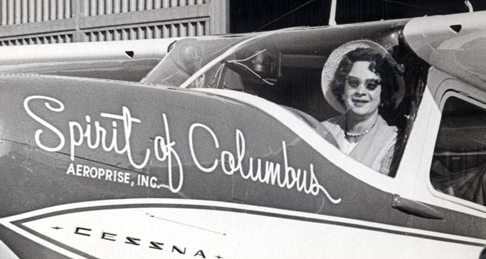BRING THE GRANDMOTHERS FORWARD!
Discover some heroines you may have missed...
Delores Huerta, a civil rights heroine, served as Caesar Chavez's central strategist in their campaign to improve the working conditions of farm laborers. Knick named the "Dragon Lady," this 5-foot-tall dynamo, co-founded the National Farm Workers Association which later became the United Farm Workers. Farm workers often including children labored in terrible conditions with no toilets ir water. Huerta helped organize the Delano grape strike in 1965 in California and was the lead negotiator in the workers' contract that was created after the strike. Read more about Delores at https://en.wikipedia.org/wiki/Dolores_Huerta.
Geraldine (Jerrie) Mock, an unassuming housewife from Columbus, Ohio, was the first woman to fly solo around the world in 1964. She piloted her single-engine Cessna 180 named "The Spirit of Columbus" for 29 days in a circumnavigation from Columbus to Columbus. Everyone know Amelia Earhart, why don't we remember Jerrie? History has only given a slight nod to Mrs. Mock’s accomplishments and that is all right with her. Geraldine never set out to do something so incredible for the publicity; she did it to satisfy her sense of adventure and a yearning to go and do what others have only dreamed of doing. Read more about this amazing aviator as https://airfactsjournal.com/2012/11/geraldine-mock-and-the-spirit-of-columbus/.
Please recommend women who deserve to be remembered--there may even be some in your own family history. For inspiration, read Seven Brave Women by Betsy Hearne, a book for K-4th grade students, and take a journey through time as a young girl recounts the exploits of her female ancestors, seven brave women who left their imprints on the past and on her. Beginning with the great-great-great-grandmother who came to America on a wooden sailboat, these women were devout and determined and tireless and beloved. When I read to classes at school, my assignment to the kids was to go home and ask about brave women in their families. Their favorite story from the book was the one where the women had to sew up her own injured hand with her regular needle and thread!
Our Own Family Heroines:
My own grandmother, Mildred Stidger Peckinpaugh, raised four sons while her husband, Roger, played professional baseball for the Yankees, Senators and Cleveland Indians. Each spring she would put the boys in her car and drive to Florida for spring training. There were no motels in those days so she would stop at farms and ask if they could have a meal and spend the night, eventually developing a chain of safe havens to stay in along the way. During the summers she would sometimes take them to see the team on the road. In Saint Louis, my dad remembered, she would soak the sheets in the bathtub, wring them out, spread the over the boys and start the fan to help them stay cool as they slept in the non-air-conditioned summer heat. When Grandpa became the manager in Cleveland, she gave holiday parties featuring an enormous side of beef which the players would eat by cutting off blood-red slices with their pocket knives and she formed the first support group for wives of Indians' baseball players.
Photo credit: Warren Leffler, U.S. New & World Report Magazine
On July 4, 2019, Time Magazine published an article called, “15 unsung moments from American history.” Mississippi Freedom Democratic Party delegate Fannie Lou Hamer speaks out for the meeting of her delegates at a credential meeting prior to the formal meeting of the Democratic National Convention.
On Aug. 22, 1964, Fannie Lou Hamer delivered one of the most powerful speeches in U.S. history. The fiery civil rights activist traveled all the way from Mississippi to Atlantic City, N.J., to challenge the all-white Mississippi delegation to the Democratic National Convention (DNC). Before a televised audience of millions of viewers, this former sharecropper, who had registered to vote for the first time in her 40s, demanded black political rights and boldly denounced voter suppression and state-sanctioned violence. Despite President Lyndon B. Johnson’s attempt to silence Hamer, her testimony sent shock waves throughout the nation, and set in motion a series of events that ultimately led to the passage of the 1965 Voting Rights Act. Mainstream narratives of the Civil Rights Movement tend to focus on high-profile events — and often through the perspectives of men. Yet Hamer’s story, and her iconic speech before the DNC in 1964, represent one of the most significant developments during this period.



